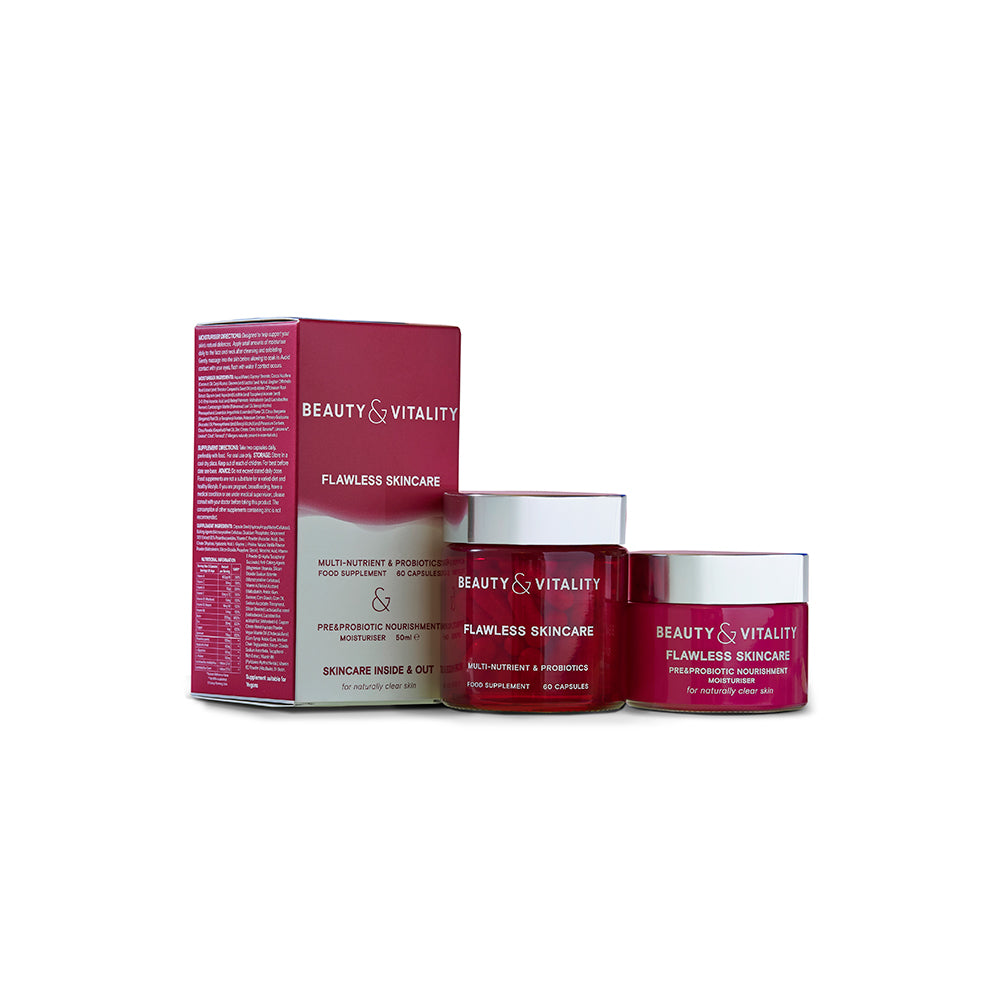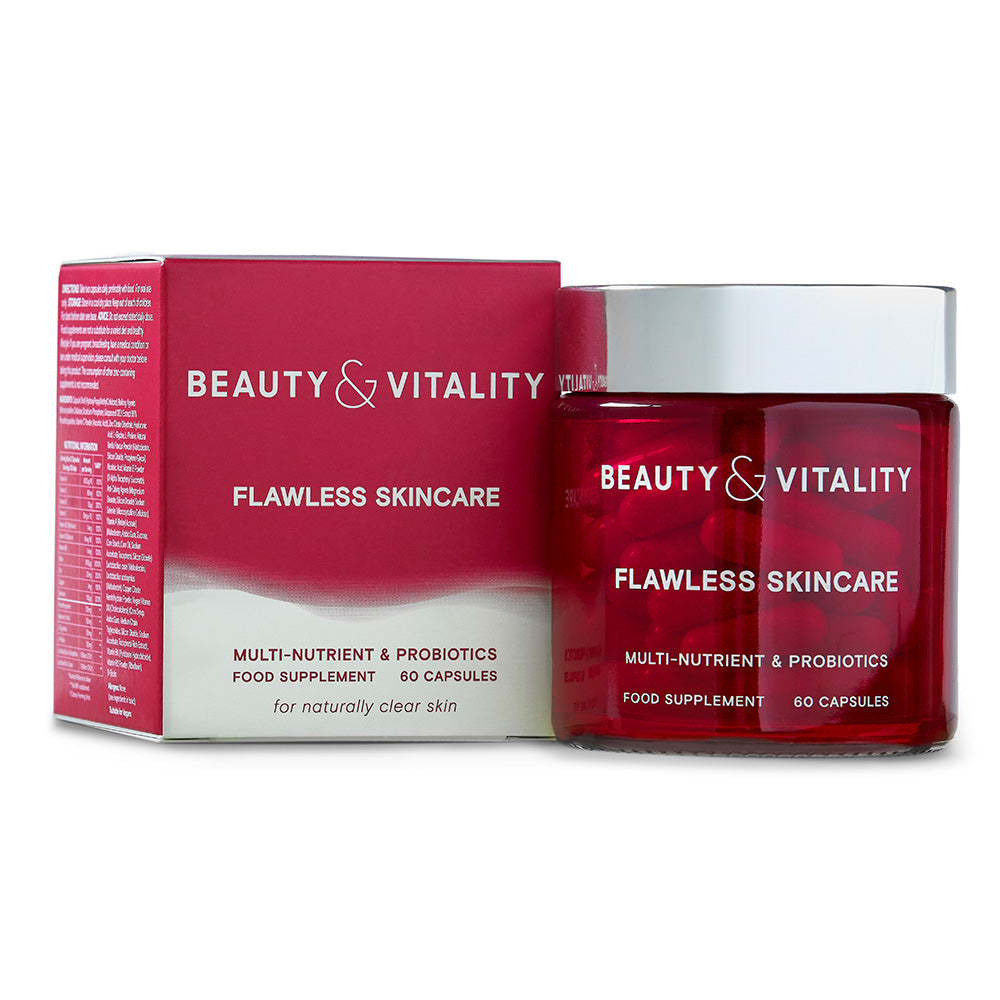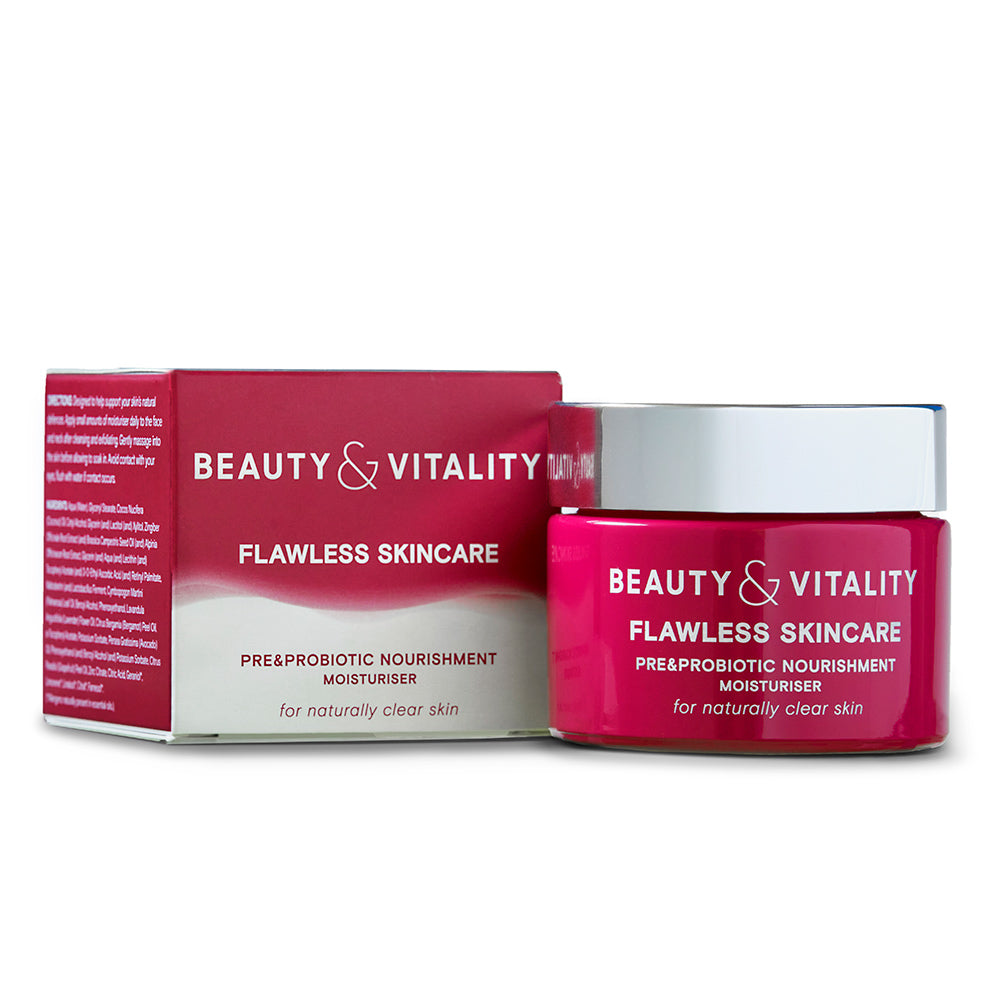
A new line of scientific research focuses on interactions between the microbiota and our skin to identify likely causes of acne and how best to treat them. This article reviews some of the causes of acne and suggests microbiome treatments, such as the Beauty & Vitality Flawless range, may be a better alternative solution to traditional off the shelf products.
We all know what acne is. Indeed, we are all likely to experience some form of breakout in our lives. But why do they occur? For many years scientific research has focused on acne but recently this line of enquiry has started reviewing the interactions of the microbiota (the thousands of micro-organisms that live symbiotically on our skins) with the skin, to try to identify more about the causes of acne, and how best to treat it.
What is Acne?
Acne (acne vulgaris) is the most common cause of spots and pimples and is often associated with the over production of sebum in the skin which blocks pores, trapping bacteria within the layers of the epidermis. This in turn creates inflammation and the production of pus. Acne can be mild, causing blackheads and whiteheads or become more severe resulting in breakouts of large spots and cysts. Breakouts tend to be in teenagers and the under-25s but can also occur in older adults.
Likely causes of, or factors that contribute to Acne
- Hormonal changes or imbalances: this commonly includes the effects of puberty, but breakouts can also occur during menstruation.
- A diet high in sugar or carbohydrates with a high glycaemic index (GI): long term high sugar or high-GI diets can cause resistance to insulin, even in those that don’t develop diabetes. Insulin imbalances may stimulate testosterone production that may lead to acne.
- Deficiencies in Vitamin B6 and Zinc: these nutrients help regulate hormones, so any deficiencies may trigger or worsen acne
- Congested Liver: the toxins we face with the modern lifestyles may lead liver struggling to cope with everyday detoxification processes. If the liver is unable to efficiently rid the body of used hormones, they may build up in the body resulting in conditions like acne.
- Stress can lead to hormone imbalances.
- Contraceptive pills may interfere with natural hormone levels and deplete vitamins and minerals such as Vitamin B6 (Do not stop taking the contraceptive pill without consulting your doctor).
- Genetics may also play a role.
Probiotic Infused Skincare Solutions

New Clean Formula Flawless Multi-Nutrient & Moisturiser Kit

New Clean Formula Flawless Skincare Multi-Nutrient (60 tablets)

Flawless Skincare Prebiotic & Probiotic Moisturiser (50ml)
Solutions
There are many off-the-shelf acne treatments but few that address microbiome considerations. Increasingly scientific research is pointing to the interaction between skin microbes and the individual’s immunity as a possible origin / cause of acne.
“The microbiome is a key regulator for the immune system. A change or loss of microbial diversity and/or loss of beneficial bacteria in the skin and/or gut microbiome is associated with an altered immune response, which can lead to the development of skin diseases, such as atopic dermatitis, psoriasis, acne vulgaris, dandruff, and even skin cancer.”[i]
The microbiome of acne sufferers is different to those without. Acne may be an immune response to a change in gut health for example, triggered by stress or lifestyle changes. Anti-biotics and topicals designed to counter breakouts can work but can also leave the skin feeling dry and irritated and may also impact the microbiome of the gut.
So how might microbiome treatments help? The balance of microbiota on our skins can be attributed to our internal health & the impact of our lifestyles and surroundings. Probiotics taken orally help create a happy healthy gut, reducing toxicity in the blood stream and so improving the absorption of important minerals, vitamins and nutrients that help the body’s ability to rid itself of the waste that causes inflammation. This in turn feeds the skin’s microbiota with the right nutrients boosting the microbiota’s survival chances and promoting the development of good bacteria to combat unwanted pathogens, improving the balance of the skin’s microbiome to help reduce acne and other skin conditions.
But how do we get the nutrients to the skin’s microbiome? A probiotic supplement taken orally, can help the gastrointestinal tract which in turn improves the body’s immune response improving its potential to reduce skin inflammations such as acne. Further a healthy balance of microbiota in the gut boosted by probiotic enriched supplements and topicals can help boost the microbiota and strengthen the skin barrier, restoring balance to the microbiome. In turn a balanced microbiome can help reduce conditions like eczema, acne, dry skin, even wrinkles. “Conditions like rosacea, psoriasis, eczema, and acne are really inflammatory conditions, and often a manifestation of something that is happening deeper within the body. When you fix the gut (which, depending on your health, might include getting rid of an infection, eating a clean diet, and taking a probiotic), skin issues often resolve as well,” said Dr Amy Myers[iii]
Pre and probiotics combined are noted as a more efficient way to improve skin microbiome balance. Topical applications have a direct effect on the site where the cream is applied, enhancing the skin defence barrier. A probiotic taken orally helps the microbiota produce a beneficial immune response, eliminating potential pathogens. Prebiotics are effectively food for the good bacteria, further boosting the skin’s immune response.[iv]
So yes – a healthy gut can help with acne and other breakouts and our recommended solution to improve gut health is the Beauty & Vitality’s Flawless Skincare Probiotic Multi-Nutrient combined with the topical application of the pre & probiotic infused Flawless Moisturiser.
Beauty & Vitality – helping you get the glow inside and out.
References:
[i] Gut–Skin Axis: Current Knowledge of the Interrelationship between Microbial Dysbiosis and Skin Conditions by Britta De Pessemier, Lynda Grine, Melanie Debaere, Aglaya Maes, Bernhard Paetzold, and Chris Callewaert; Microorganisms 2021, 9(2), 353; https://doi.org/10.3390/microorganisms9020353
[ii] Acne vulgaris, probiotics and the gut-brain-skin axis - back to the future? By Whitney P Bowe and Alan C Logan, Published online 2011 Jan 31. https://gutpathogens.biomedcentral.com/articles/10.1186/1757-4749-3-1
[iii] Dr. Amy Myers https://goop.com/wellness/health/the-good-skin-healthy-gut-guide-to-probiotics/ Amy Myers, M.D.
[iv] Impact of prebiotics and probiotics on skin health; F H Al-Ghazzewi, R F Tester. Published Online: February 28, 2014: https://www.wageningenacademic.com/doi/10.3920/BM2013.0040
Safety
The information provided on this site is for educational purposes only and is not intended to diagnose or treat any medical condition. If you are taking any medications, have a diagnosed medical condition, or are pregnant or breastfeeding, please consult your doctor or health practitioner before taking supplements.
